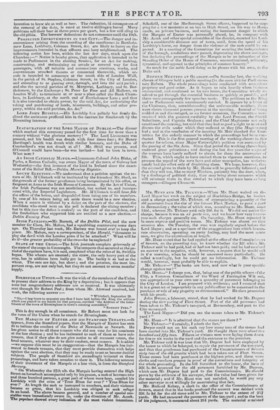BIRMINGHAM' UNION.—It was the wish of the members of the
Union to present their address to the King by a deputation ; but it appears that none but congratulatory addresses are so received. It was ultimately sent through Sir Robert Peel ; from whom Mr. Attwood received, last week, the following answer :—
"Whitehall, September 29.
"Sir,—I beg leave to acquaint you that I have laid before the King the address which you placed in my hands for that purpose, entitled 'the Address of the Inhabitants of the town of Birmingham in town's meeting assembled.'
"ROBERT PEEL."
This is dry enough in all conscience. Sir Robert must not look for the votes of the Union when he stands for Birmingham.
THE MARQUIS OF EXETER AND IIIS STAMFORD TENANTS.--It appears, from the Stamford papers, that the Marquis of Exeter has seen fit to imitate the conduct of the Duke of Newcastle at Newark. He has given notice to all those tenants who did not vote for his nominees at the late election ; and he has intimated to such of them as have subtenants, that if they also do not give notice to all recusant voters the bead tenants, whatever may be their conduct, must remove. It is added —we suppose this must be an exaggeration—that the Marquis has intimated to female tenants, that they must provide themselves with helps against the next election, that they may be ready to act as become dutiful subjects. The people of Stamford are, exceedingly irritated at these proceedings, and have taken occasion to show it. The following account of their treatment of the Marquis at a late visit, is from the Stamford Mercury.
"On Wednesday the 27th ult. the Marquis having entered the High Street on horseback accompanied only by his groom, a mob of between two and three hundred persons, a great part of whom were boys, assailed his Lordship with the cries of 'True Blues for ever !' True Blues for ever!' At length the mob so increased in numbers, and their violence became so great, that his Lordship was obliged to seek refuge in an hotel. The alarm became general, and a number of special constables were immediately sworn in, under the direction of Mr. Acock. The populace showed every indication of the most violent intentions.
• Schofield,. one of the Marlborough Street officers, happened to he stopping forâ few Moments at an inn in High Street, on Isis way to Horn. castle, on private business, and seeing the imminent danger in which the Marquis of Exeter was personally placed, he, in company with Mr. Aced( and other special constables of the district, escorted his Lordship a considerable distance out of town' until, from the speed of his Lordship's horse, no danger from the violence of the snob could be expected. At a meeting of the Committee for securinf, the independenies of the borough, resolutions were passed, deprecating the above outrages, but declaring the proceedings of the Marquis to be an infraction el the Standing Order of the House of Commons, unconstitutional, arbitrary, tyrannical, and opposed to the principles of common honesty."
So much for the noble Lord doing as lie pleases with his own, as the Duke said.
REFORM MEETING AT GLASG0117.-011 Saturday last, the worhing, classes of Glasgow held a public meeting (in the open air) for Parlimmentary Reform. The whole proceedings were conducted with seem 11.;us propriety and good order. As it began to rain heavily when bt.si nese commenced, and continued so for two hours, the Committee wisely resolved to get through the essential business as quickly as possible, and there were consequently few speeches made. The petitions to the King and to Parliament were unanimously carried. It appears by a letter of tile Chairman, that, notwithstanding the unfavourable weather, there were eleven thousand persons present at the meeting. Instead of being scolded at and discouraged, as on former occasions, the Committee were received with the greatest cordiality by the Lord Provost, the Sheriff Substitute, and Captain Graham ; and the Chief Magistrate not only sanctioned the meeting, but said that they had as good a right to met and discuss the evils under which they suffered as they (the Magistrates) had ; and at the conclusion of the meeting Mr. Moir thanked the Committee for the orderly manlier in which the proceedings had bee conducted. This is the first general meeting of the working-classes in this quarter for reform, since Major Cartwright's petition was answered by the passing of the Six Acts. Since that period the working classes have endured great privations ; and during the last five years the wages of the weavers have barely sufficed to obtain for them the necesseries of life. This, which ought to have excited them to vigorous exertions, to procure the repeal of the corn laws and other monopolies, has unfortunately had the effect only of dispiriting them. We hope, however, that the counsel given to them by Mr. Hume will be generally followed ; amid that they will not, like so many Ilindoos, patiently bite the dust, when, by a discharge of political duty, they may bring about measures which will reinstate them in that comfort to which they have been so long strangers.—Glasgow Chronicle.


























 Previous page
Previous page